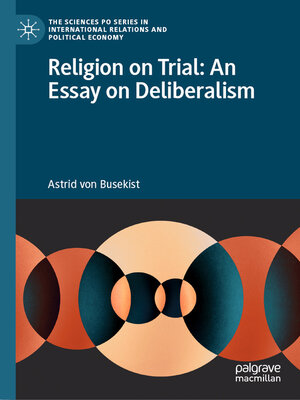Religion on Trial
ebook ∣ An Essay on Deliberalism · The Sciences Po Series in International Relations and Political Economy
By Astrid von Busekist

Sign up to save your library
With an OverDrive account, you can save your favorite libraries for at-a-glance information about availability. Find out more about OverDrive accounts.
Find this title in Libby, the library reading app by OverDrive.



Search for a digital library with this title
Title found at these libraries:
| Library Name | Distance |
|---|---|
| Loading... |
The book deals with three specific encounters between the law and religious commandments: “separationism”, “composition”, and “cooperation” (homeschooling, circumcision, the “Get-laws”), and how legal practitioners handle hard cases on a pragmatic basis.
Its distinctiveness might me summarized as follows:
The book is based on 3 empirical real-life scenarios (see Introduction) involving confrontations between religious commandments and secular law; conflicts between fundamental principles of different normative orders.
Instead of asking how the liberal constitutionalism should normatively handle these cases (as the books and articles of my competitors listed below do), I suggest that the threshold between permissible / compatible religious practices is moving and should be treated contextually and pragmatically.
My main claim is that there is not one single version of “secularism” (or “laïcité” in the French context), but a multiplicity of possible dialogues between representatives of faith communities and representatives of the legal / political community.
My scenarios show that decisions are guided by a context-specific balance between democratic values, foremost equality and freedom. Sometimes these cardinal values conflict and judges must rank them. The articulation between religion and politics is not stable, not written in advance, not subsumable under a clear rule; legal principles are not hierarchically ordered a priori as all my cases show, even first-order principles (freedom/equality) must sometimes be weighed against each other.
I try to theorize each of these pragmatic interactions under the umbrella-concept of “deliberalism” and show that my scenarios display three different types of interaction between orders that range from a strong separation to outright cooperation.
The counterintuitive dimension of my book is to say that even in a very well-documented field, (Church and state-relations), secularism is not a thick concept, not a theory, but a practice.







